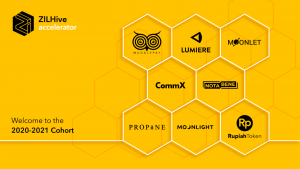Singapore holds its financial hub in high esteem. Government and regulators have pushed through several initiatives, and are not shying away from more obscure, but technologically promising areas such as cryptocurrencies. In July, Project Ubin concluded with a final report. Since 2016, the Monetary Authority of Singapore, Temasek, and private entities tested how blockchain technology could be used for clearing and settlement of payments and securities.
Although it’s still not clear which, if any, commercial applications might come out of it, there have been interesting ideas. One is a Singapore dollar-pegged “stablecoin,” named XSGD and officially launched this Monday, which uses the public blockchain Zilliqa.
“I think eventually everybody will start to adopt stablecoins,” Han Wen Chua, a VP at Zilliqa, told KrASIA in a recent interview. Chua named three main arguments that play in favor of the digital currency: cost, speed, and transparency. “Money transfers can be made transparent and auditable by regulators,” he said. Although transactions are anonymous and encrypted on the blockchain, capital flows can still be traced.
Transfers also happen almost instantly. “It takes a few seconds to reach the person without having a counterparty risk,” Chua said. Value is exchanged directly, there are no third parties involved, and no settlement risk. Once there is a transaction, the connected “nodes” will simultaneously update a shared ledger of which all participants keep a copy. There is only a minimal cost involved, “a fraction of the price one pays with TransferWise or DBS,” Chua explained.
Chua is responsible for “ecosystem growth” at Zilliqa and runs the ZILHive accelerator program that kicked off at the end of August. “There’s not really a way to incubate and fund talents in the space,” he said. “We want to build that up.” The program includes a bootcamp, education, and grants. Among the eight startups of the first batch are projects like “Rupiah token” which aims to build a stablecoin for the Indonesian currency and an Australian team that plans to “tokenize” art.
The tokenization of illiquid assets had been a much-hyped use case for blockchain technology that hasn’t really taken off. “Let’s say I have an aircraft or a ship—if I can tokenize the asset, I don’t have to take the loan from the bank,” Chua explained. The purchaser of the tokens will then own a fraction of the ship or aircraft. “I think DeFi could make every single illiquid asset in the world, hopefully, liquid,” he said.

DeFi stands for “decentralized finance,” which is currently whipping up hype of its own, notably in a category called “yield farming,” where coin owners can stake or lock up their crypto and earn a return, as well as lending platforms that allow people to borrow cryptocurrencies and offer loans “peer-to-peer.” Interest rates are calculated algorithmically and in many cases have skyrocketed into the high double-digits.
“DeFi started off the year with USD 1 billion locked into smart contracts,” said Chua. “It has risen eightfold within a span of six to seven months.” Smart contracts can be understood as programs that have agreements written in code that execute themselves. They are mostly run on Ethereum, which is another blockchain.
“We are competing with them,” said Chua. “But think of Zilliqa as an Ethereum on steroids.” The firm claims to process transactions faster than other chains, using a technique called “sharding,” which divides the network into smaller groups of nodes. This makes the system scalable, a problem Ethereum had to contend with recently, when large demand pushed up fees. Chua also pointed to the fact that Zilliqa is truly decentralized, which means that it doesn’t have a central authority that could reverse transactions, making it more like the Bitcoin network. “That’s where the security really comes from,” he said.
Many issues to solve
Zilliqa wants to get in the DeFi game as well, although adoption has been slow so far, especially in Southeast Asia. For Chua, there is a persistent onboarding problem, hindering access to stablecoins, and a lack of applications. “The complexity is really frustrating due to regulations, and it’s up to the innovators to try to solve all these issues,” he said.
Singapore is already seeing some advanced use cases in private blockchains. The firm iStox, which earlier this year became a recognized market operator, is working with the Singapore Exchange on the fractionalization of bonds, opening up the space for a broader range of investors. Chua comments that traditional finance often still prefers the closed system of a private blockchain.
Zilliqa’s public blockchain is behind “Southeast Asia’s first private securities exchange” HGX, which counts local broker PhillipCapital as well as securities crowdfunding platform Fundnel among its founding members, and aims to fractionalize private investments to make them tradable.
Another problem Chua identifies is the lack of venture capital in the space. “There are only a few funds, it is one of the problems that we really want to tackle,” he said. Zilliqa is planning to set up its own fund and is already talking to potential backers. Chua hopes that they can become one of the leading investors here and defy established financial institutions. “What we really want to do is to fight some of the existing traditional infrastructure,” he said.

